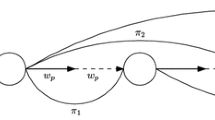Abstract
Two new algorithms are given for randomized consensus in a shared-memory model with an oblivious adversary. Each is based on a new construction of a conciliator, an object that guarantees termination and validity, but that only guarantees agreement with constant probability. The first conciliator assumes unit-cost snapshots and achieves agreement among n processes with probability \(1-\epsilon \) in \(O(\log ^* n + \log (1/\epsilon ))\) steps for each process. The second uses ordinary multi-writer registers, and achieves agreement with probability \(1-\epsilon \) in \(O(\log \log n + \log (1/\epsilon ))\) steps. Combining these constructions with known results gives randomized consensus for arbitrarily many possible input values using unit-cost snapshots in \(O(\log ^* n)\) expected steps and randomized consensus for up to \((\log n)^{O(\log \log \log n)}\) possible input values using ordinary registers in \(O(\log \log n)\) expected steps.
Similar content being viewed by others
Notes
As observed by an anonymous referee, because Algorithm 1 only uses the snapshot to obtain the maximum current value in the array, max registers [7] would work as well.
If bounded space is important, adding a layer of indirection by replacing each input with the id of the process that holds it reduces the size of each snapshot component to \(O(\log n \log ^* n)\) bits, although this still requires reading \(O(n \log n \log ^* n)\) bits in a single atomic operation.
What we are doing here is very similar to counting left-to-right maxima or outstanding values of a random permutation. There is an extensive literature on the distribution of the number left-to-right maxima, going back to a classic paper of Rényi [21], but for our purposes a simple linearity-of-expectation bound is enough.
A similar technique was used in [6] to combine interleaved shared-coin algorithms into a single shared coin, but this result depends on the output of a shared coin not always being under the control of the adversary. Unlike the shared-coin case, it is not clear that interleaving arbitrary conciliators will always give a conciliator.
References
Alistarh, D., Aspnes, J.: Sub-logarithmic test-and-set against a weak adversary. In: Distributed Computing: 25th International Symposium, DISC 2011, Lecture Notes in Computer Science, vol. 6950, pp. 97–109. Springer (2011)
Alistarh, D., Gilbert, S., Guerraoui, R., Travers, C.: Of choices, failures and asynchrony: the many faces of set agreement. In: Dong, Y., Du, D.Z., Ibarra, O.H. (eds.) ISAAC, Lecture Notes in Computer Science, vol. 5878, pp. 943–953. Springer (2009)
Aspnes, J.: Randomized consensus in expected \(O(n^2)\) total work using single-writer registers. In: Distributed Computing: 25th International Symposium, DISC 2011, Lecture Notes in Computer Science, vol. 6950, pp. 363–373. Springer (2011)
Aspnes, J.: Faster randomized consensus with an oblivious adversary. In: 2012 ACM Symposium on Principles of Distributed Computing, pp. 1–8 (2012)
Aspnes, J.: A modular approach to shared-memory consensus, with applications to the probabilistic-write model. Distrib. Comput. 25(2), 179–188 (2012)
Aspnes, J., Attiya, H., Censor, K.: Combining shared coin algorithms. J. Parallel Distrib. Comput. 70(3), 317–322 (2010)
Aspnes, J., Attiya, H., Censor-Hillel, K.: Polylogarithmic concurrent data structures from monotone circuits. J. ACM 59(1), 2:1–2:24 (2012)
Aspnes, J., Censor, K.: Approximate shared-memory counting despite a strong adversary. In: SODA ’09: Proceedings of the Nineteenth Annual ACM-SIAM Symposium on Discrete Algorithms, pp. 441–450. Society for Industrial and Applied Mathematics, Philadelphia, PA, USA (2009)
Aspnes, J., Ellen, F.: Tight bounds for anonymous adopt-commit objects. In: 23rd Annual ACM Symposium on Parallelism in Algorithms and Architectures, pp. 317–324 (2011)
Attiya, H., Censor, K.: Tight bounds for asynchronous randomized consensus. J. ACM 55(5), 20 (2008)
Attiya, H., Censor-Hillel, K.: Lower bounds for randomized consensus under a weak adversary. SIAM J. Comput. 39(8), 3885–3904 (2010)
Aumann, Y.: Efficient asynchronous consensus with the weak adversary scheduler. In: PODC ’97: Proceedings of the Sixteenth Annual ACM Symposium on Principles of Distributed Computing, pp. 209–218. ACM, New York, NY, USA (1997)
Chandra, T.D.: Polylog randomized wait-free consensus. In: Proceedings of the Fifteenth Annual ACM Symposium on Principles of Distributed Computing, pp. 166–175. Pennsylvania, USA, Philadelphia (1996)
Chor, B., Israeli, A., Li, M.: Wait-free consensus using asynchronous hardware. SIAM J. Comput. 23(4), 701–712 (1994)
Fischer, M.J., Lynch, N.A., Paterson, M.S.: Impossibility of distributed consensus with one faulty process. J. ACM 32(2), 374–382 (1985)
Gafni, E.: Round-by-round fault detectors: Unifying synchrony and asynchrony (extended abstract). In: Proceedings of the Seventeenth Annual ACM Symposium on Principles of Distributed Computing, pp. 143–152 (1998)
Giakkoupis, G., Woelfel, P.: On the time and space complexity of randomized test-and-set. In: 2012 ACM symposium on Principles of Distributed Computing, pp. 19–28. ACM, New York, NY, USA (2012)
Golab, W.M., Higham, L., Woelfel, P.: Linearizable implementations do not suffice for randomized distributed computation. In: Fortnow, L., Vadhan, S.P. (eds.) STOC, pp. 373–382. ACM (2011)
Loui, M.C., Abu-Amara, H.H.: Memory requirements for agreement among unreliable asynchronous processes. In: Preparata, F.P. (ed.) Parallel and Distributed Computing. Advances in Computing Research, vol. 4, pp. 163–183. JAI Press, Greenwich, Conn., (1987)
Mostefaoui, A., Rajsbaum, S., Raynal, M., Travers, C.: The combined power of conditions and information on failures to solve asynchronous set agreement. SIAM J. Comput. 38(4), 1574–1601 (2008)
Rényi, A.: Théorie des éléments saillants d’une suite d’observations. Annales scientifiques de l’Université de Clermont-Ferrand 2, série Mathématiques 8(2), 7–13 (1962)
Author information
Authors and Affiliations
Corresponding author
Additional information
An earlier version of this work appeared in the 2012 ACM Symposium on Principles of Distributed Computing [4]. The author was supported in part by NSF Grant CCF-0916389.
Rights and permissions
About this article
Cite this article
Aspnes, J. Faster randomized consensus with an oblivious adversary. Distrib. Comput. 28, 21–29 (2015). https://doi.org/10.1007/s00446-013-0195-y
Received:
Accepted:
Published:
Issue Date:
DOI: https://doi.org/10.1007/s00446-013-0195-y




